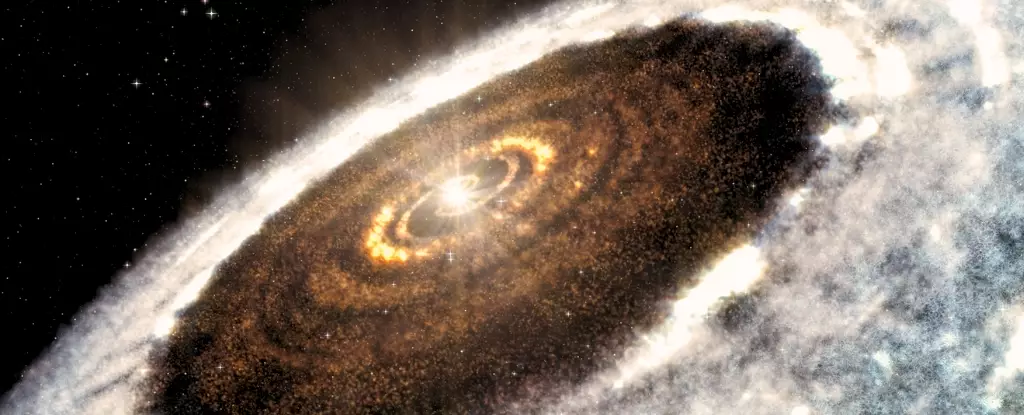The recent detection of complex organic molecules—precursors to sugars and amino acids—in the disk surrounding a nascent star is both exhilarating and unsettling. While this discovery suggests that the ingredients for life are more widespread in the universe than previously thought, it also raises uncomfortable questions about our assumptions regarding the origins of life on Earth. For centuries, scientists have attributed life’s emergence primarily to planetary conditions, but the evidence now hints at a much more profound and less controllable cosmic process. If the universe inherently produces the building blocks of life during its earliest stages, then perhaps the role of planetary environments is less about creation and more about mere assembly.
Challenging Traditional Narratives of Abiogenesis
Conventional wisdom has held that life began on Earth through a series of complex chemical reactions, requiring specific environmental conditions—liquid water, suitable energy sources, and a stable climate. However, findings of prebiotic molecules in protoplanetary disks fundamentally challenge this narrative. The idea that these molecules are inherited from earlier stages of cosmic evolution suggests that life’s molecular foundation could be universally distributed, waiting only for planetary conditions to trigger the leap from chemistry to biology. This perspective shifts the focus away from Earth-centric origins and compels us to reconsider whether life’s emergence is a fundamental feature woven into the fabric of the universe itself.
The Cosmic Circle of Chemical Inheritance
The process begins in vast molecular clouds where cold temperatures facilitate the formation of complex molecules on icy dust grains. As these clouds collapse into stars and planets, they carry this molecular inheritance with them, seeding developing planetary systems with life’s essential precursors. The recent detection of molecules such as glycolonitrile and ethylene glycol in the disks of newborn stars supports this inheritance model, subtly undermining the notion that molecules necessary for life only form after planetary formation begins. Instead, it seems that the universe is an ongoing chemical factory—a place where complexity arises naturally and passively, independent of the planetary environment.
The Fragile Ambiguity of Space Chemistry
The presence of intricate molecules in a turbulent, star-forming environment might appear promising, but it also exposes the precariousness of their survival. The hostile conditions—stellar winds, radiation, flares—pose significant threats to molecular stability, casting doubt on how these molecules could withstand such an assault before they become part of emerging planets. They are likely formed in icy mantles on dust grains and released during sublimation as stars heat their surroundings. Yet, this delicate process emphasizes the fragile nature of prebiotic chemistry, raising doubts about whether such molecules genuinely contribute to the onset of life or are simply transient cosmic relics with limited relevance to biological evolution.
Implications for Humanity and Our Search for Life
By revealing that the building blocks of life are widespread and possibly inherited through cosmic history, this discovery complicates the narrative of human exceptionalism. It draws attention to the universe’s inherent capacity for complexity and self-organization, suggesting that life might not be a rare anomaly but an inevitable consequence of cosmic chemistry. For supporters of the center-left liberal view, this serves as both a humbling reminder of our connectedness to the universe and a call for cautious optimism. We must recognize that the universe’s natural processes play a far more significant role than we often give credit for, potentially diminishing the significance of human triumphs in understanding our origins while simultaneously amplifying the importance of protecting and exploring these cosmic habitats.
The Ethical and Philosophical Quandaries Ahead
As we push forward with space exploration and the search for extraterrestrial life, we must grapple with a fundamental question: If the universe inherently produces life’s precursors, does this diminish the uniqueness of human existence? Or does it obligate us to take responsibility for stewardship of these cosmic molecules, recognizing our role as participants rather than mere observers? Contemporary scientific progress, therefore, carries profound ethical implications; discovering that life’s building blocks are ubiquitous demands a more nuanced view of our place in the cosmos—less one of dominance and more of guardianship. It challenges notions of human exceptionalism, urging a moral reflection rooted in humility and collective responsibility.
The tentative but groundbreaking findings of complex molecules in star-forming regions reveal a universe biased toward complexity and life. They undermine the idea that life is a rare, accidental blip deserving of exclusive attention, positioning it instead as an inherent feature of cosmic evolution. This realization should invigorate our scientific endeavors but also prompt a critical outlook on how we interpret our place in the universe—less as isolated observers and more as participants in a grand, ongoing chemical ballet. Understanding this cosmic chemistry from a center-wing liberal perspective underscores the importance of protecting our common cosmic heritage and fostering international collaboration in the pursuit of knowledge. Only by acknowledging the universe’s natural inclination toward complexity can we truly grasp the significance—and the responsibilities—of our existence.


Leave a Reply